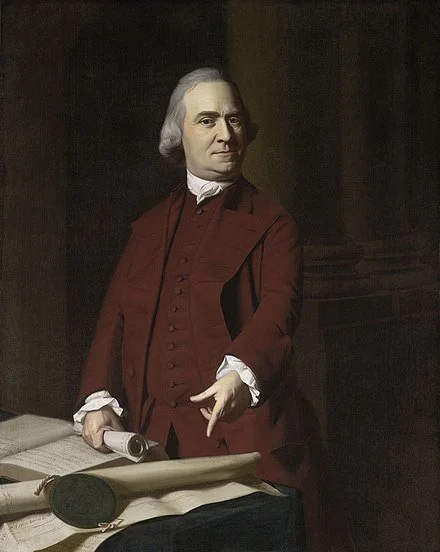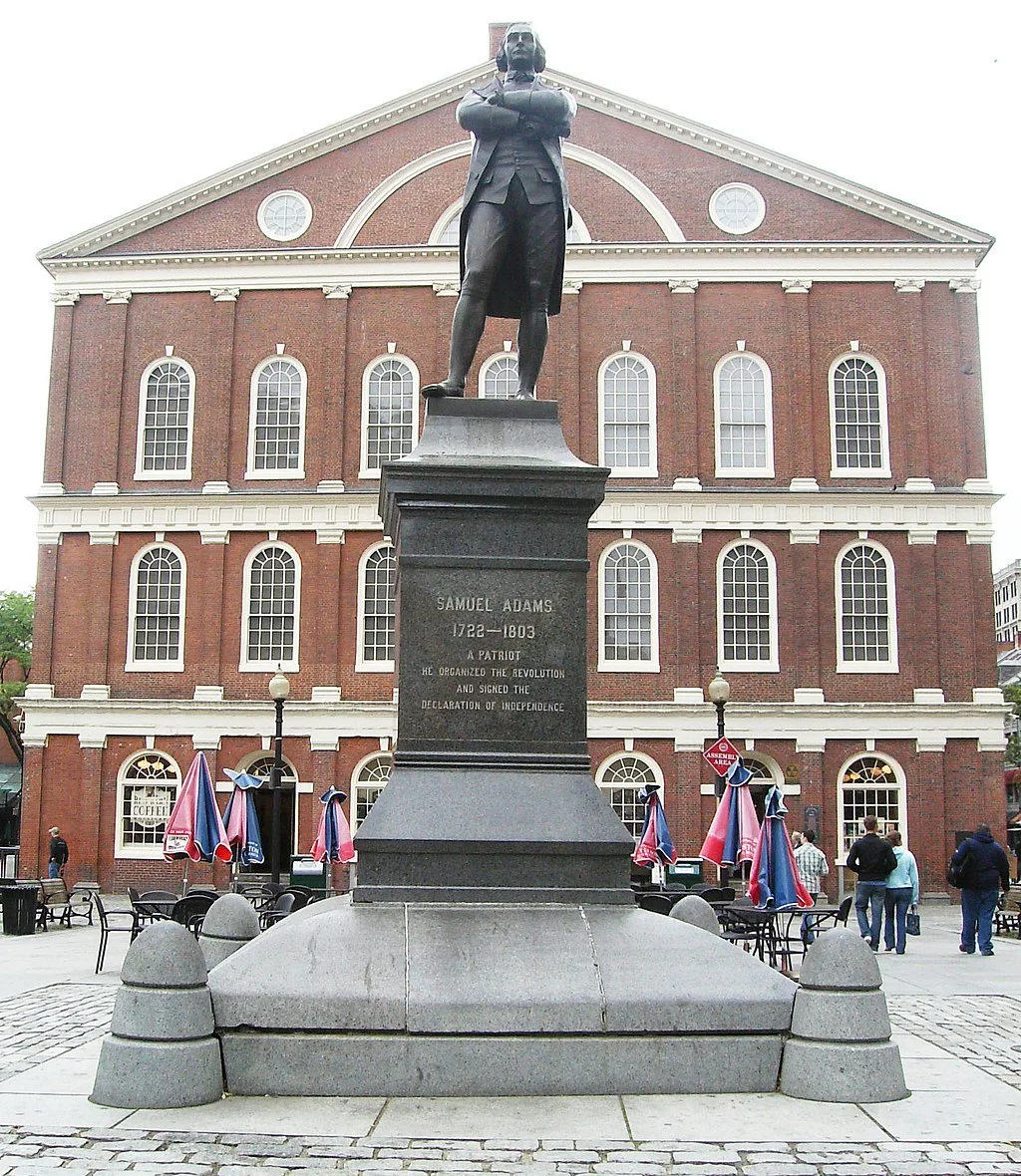
Podcast: 'Ideas actually matter’
In this c. 1772 portrait by John Singleton Copley, Samuel Adams points at the Massachusetts Charter, which he viewed as a constitution that protected the people’s rights.
From Lapham’s Quarterly:
“‘I think that I started the book,’ historian Stacy Schiff says of The Revolutionary: Samuel Adams, ‘with this thirst for somebody who—I’ve just been writing about the Salem witch trials for many years. And I was looking for someone who had the courage of his convictions, to stand up and take an unpopular stand, which is something that takes a very long time for anyone to do in the Massachusetts Bay Colony in 1692, when it was very dangerous to take that stand. As it is dangerous again in the 1760s. And Adams very much fit that description. The more time I spent with him, the more time I was convinced and remain convinced that he teaches you that one person can actually make a difference and that ideas actually matter.”’
Lewis H. Lapham speaks with Stacy Schiff, author of The Revolutionary: Samuel Adams
‘Their last asylum’
Bronze and granite monument to Samuel Adams, put up in 1880 in front of Faneuil Hall, in downtown Boston. The hall was the home of the Boston Town Meeting, on Sept. 12 and 13, 1768, an extralegal assembly held in response to the news that British troops would soon be arriving to crack down on anti-British rioting.
— Photo by Anne Whitney
“Driven from every other corner of the earth, freedom of thought and the right of private judgment in matters of conscience direct their course to this happy country as their last asylum.”
— Samuel Adams, in “Speech in Philadelphia,’’ on Aug. 1, 1776.
Samuel Adams was an American statesman, political philosopher and one of the Founding Fathers of the United States. He was a politician in colonial Massachusetts, a leader of the movement that became the American Revolution, and one of the developers of the principles of American republicanism. And he served as the Commonwealth of Massachusetts’s fourth governor (1794-1797). He was a second cousin to his fellow (and less radical) Founding Father, John Adams, the second U.S. president.
N.E. Council COVID-19 update: Beth Israel's new testing swabs; Samuel Adams aid program and more
— Photo by Raimond Spekking
BOST0N
From The New England Council (newenglandcouncil.com)
As our region and our nation continue to grapple with the Coronavirus disease (COVID-19) pandemic, The New England Council is using our blog as a platform to highlight some of the incredible work our members have undertaken to respond to the outbreak. Each day, we’ll post a round-up of updates on some of the initiatives underway among council members throughout the region. We are also sharing these updates via our social media, and encourage our members to share with us any information on their efforts so that we can be sure to include them in these daily round-ups.
You can find all the council’s information and resources related to the crisis in the special COVID-19 section of our Web site. This includes our COVID-19 Virtual Events Calendar, which provides information on upcoming COVID-19 Congressional town halls and webinars presented by NEC members, as well as our newly-released Federal Agency COVID-19 Guidance for Businesses page.
Here is the April 6 roundup:
Medical Response
Beth Israel Deaconess Medical Center Develops Prototype Testing Swabs – Confronting a shortage of testing swabs, Beth Israel Deaconess Medical Center (BIDMC) is leading efforts to mass-produce swabs. After only 15 days of research with both private and public partners, BIDMC expects to produce 10,000 swabs each day beginning next week week, eventually ramping up to 1 million daily—likely enough to supply all of America and part of Europe. Read more in The Boston Business Journal.
MIT Researchers Create Equipment Decontamination Resources– To provide advice on best practices for decontaminating and reusing protective equipment used by healthcare providers, researchers at the Massachusetts Institute of Technology (MIT) entered a consortium to create an online resource page. The site aims to help providers with limited time and resources make informed decisions on how to best use existing supplies. More from MIT News
Economic/Business Continuity Response
Boston University Provides Online Learning Resources for Deaf Children – Boston University (BU) has created a new resource—the Deaf Education Library—for deaf children to access courses, curriculum, and books in American Sign Language while they learn at home. In providing this new tool, BU noted that deaf children can find themselves in “double seclusion” as they navigate both the transition to remote learning and being sequestered with people who may struggles to communicate with them. BU Today has more.
Verizon Increases Access to Internet Resources, Employee Pay – To facilitate as smooth a transition as possible to remote work and learning, Verizon is offering access to learning tools and news channels at no additional cost. The network provider has also expanded its Pay It Forward Live gaming campaign to support small businesses affected by the outbreak, and has committed to increasing the pay for its essential employees. Read more.
Lowe’s Takes Steps to Protect Employees – To best comply with social distancing protocols, Lowe’s is working to ensure that its essential employees are protected during the pandemic. Lowe’s announced measures to restrict the number of customers in locations and has expanded remote purchasing offerings. The more stringent guidance come after Lowe’s $170 million commitment to relief efforts. Read more in The Charlotte Business Journal
Community Response
City of Boston Announces $2 Million Small Business Relief Fund – Boston Mayor Martin Walsh announced a relief fund to support small businesses directly affected by closures due to the COVID-19 pandemic. The fund—with contributions from city, private, and federal sources—will target those businesses that do not qualify for federal relief or unemployment benefits. The Boston Business Journal has more.
Northeastern University to Provide Employment and Educational Opportunities for Third-Party Employees – Northeastern University will provide educational assistance and temporary employment opportunities for campus workers who employed by third-party vendors, such as those working in dining and parking services—. Utilizing its existing network of employers usually used for its co-op program, the university will provide language, educational, and career support to address the immediate needs of these workers. Read more from News@Northeastern
Samuel Adams Offers $1,000 Payments to Out-of-Work Food Industry Employees – After establishing its Restaurant Strong Fund to raise money for workers in food service affected by revenue losses, Samuel Adams (part of Boston Beer Company) has expanded the fund’s operations to 19 additional states and is now offering a $1,000 grant to workers who have suffered financial hardship due to the pandemic. CBS Boston has more.
Stay tuned for more updates each day, and follow us on Twitter for more frequent updates on how Council members are contributing to the response to this global health crisis.




